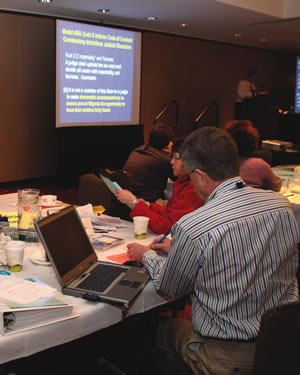Editor’s Note: The election in November 2008 was unprecedented in Indiana for the number of new trial court judges assuming duties on the bench. This article focuses attention on just two of the new jurists in our state.

Kathleen Tighe Coriden is taking her place in the judiciary with other newly elected judges from across the state. Like others, she is starting 2009 with a new set of responsibilities and great enthusiasm. She is settling into a routine as the Bartholomew Superior Court Judge. But unlike others, Coriden is accustomed to being called “Judge”, the black robe in nothing new, and presiding over a courtroom has a familiar feel—she’s been here before.
In 1999, Governor Frank O’Bannon appointed Coriden to the Bartholomew Superior Court 2 seat when Judge Norman D. Curry retired. For three years she served as the judge, presiding over both civil and criminal matters. She believed that she was doing a good job for her county and hoped to continue in the role. She ran for election in 2002 and was deeply disappointed at the outcome. Voters made the decision to elect a different person to the position. Her brief judicial career came to a halt and Coriden took it personally. When she left the bench she vowed never to run again.
Prior to her appointment Coriden had served as a deputy prosecutor. Instead of returning to that office, she took on a new challenge. She opened a law practice with her husband and son. She jokes that people asked her how she could manage being around family all the time. In reality, Coriden says they didn’t see each other that often. “We each had our own niche. My husband handled the workers’ compensation cases, my son was the city attorney, and I handled all of the family law cases. We had a breakfast meeting once a week with our office manager so we could stay connected.”
Coriden also became involved in the Court Appointed Special Advocate (CASA) program for Bartholomew and three surrounding counties. She served on the “Advocates for Children” Board of Directors—including as its President. Devoting her time to the group that advocates for abused and neglected children in state care gave her a new focus.
Over time, the wounds of the defeat began to heal. “I stopped taking it so personally. Our practice was succeeding and I was staying involved in the community.” When election time came around again, Coriden realized she wanted to run. Instead of reliving the feelings associated with her previous defeat, she concentrated on how much she loved being a judge. “Every day is different and you are confronted with a new legal issue. The experience is mind expanding, so you have to stay fresh.”
In 2008 she defeated the incumbent judge who had previously unseated her. Ten years after being appointed to the bench, Coriden became once again a Judge in Bartholomew County Superior Court after winning in the general election. As she returns to the bench, Judge Coriden brings new experiences as a seasoned practicing attorney. She is clearly more attuned to the challenges of lawyers than she was the first time she held office. She expects to draw from her time in private practice and from her involvement in CASA. Taking the bench in 2009 has a familiar feel with a fresh perspective.
The exact opposite holds true for Maria Granger. The former deputy prosecutor is taking the bench in the newly created Floyd Superior Court Three—even the courtroom is brand new. Judge Granger explained, “The staff is settling in as equipment is being installed.”
Judge Granger’s fourteen year legal career includes both private practice and time in the prosecutor’s office. Being called “Judge” still takes her by surprise. “The robe carries so much respect. You want to represent that dignity in the courtroom. I appreciate this opportunity”
The opportunity comes with its challenges. Floyd Superior Court Three was created in part to balance the county caseload. Judge Granger is very pleased that her court will handle 100% of the protective order cases. She worked with domestic violence issues as a prosecutor and believes her previous experience will allow her to serve families in crisis better. “The family is the root of the community. We need to deal with these issues.”
There is an upside to the struggles and problems that come from taking on a brand new court. Granger explained, “There is a real opportunity to move forward in an efficient manner. That is not as easily done when taking over an established courtroom.” Granger and her staff are very excited to be the first court in Floyd County to use the new statewide case management system, Odyssey. “Of course there is a learning curve, but the Supreme Court staff has been here helping us and we are moving towards streamlining our efforts. We are very proud to be a pilot group trained on the new system.”
All newly elected judges receive help and support from the Indiana Judicial Center and the Division of State Court Administration, including an extensive orientation program. Many also have guidance from long-time judges who have offered their expertise. As Maria Granger, Kathleen Tighe Coriden, and dozens of other newly elected judges step into their new roles, they arrive at the bench with unique perspectives that help shape their decision making process. Each one will work hard to make a difference and eventually leave an indelible and unique mark on the Indiana judicial system and in his/her community.